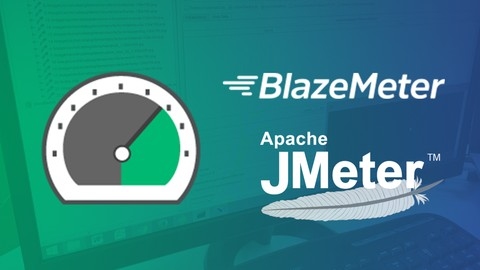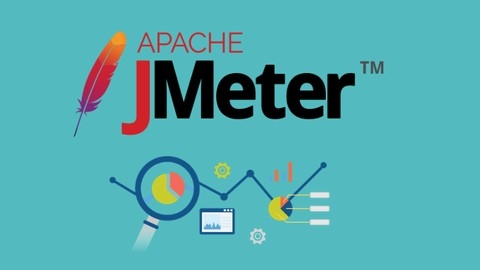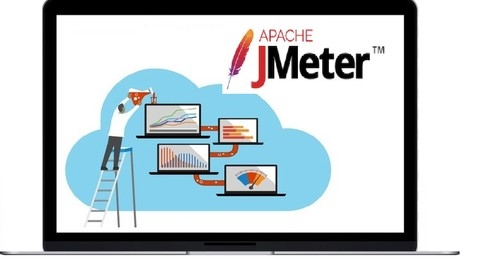Performance testing is a critical aspect of software development, ensuring that applications can handle the expected load and deliver a seamless user experience.
JMeter, a powerful open-source tool, is widely used for performance testing due to its versatility, extensibility, and comprehensive features.
By learning JMeter, you can gain valuable skills in load testing, stress testing, and performance analysis, enabling you to identify and address performance bottlenecks, optimize application performance, and contribute to the delivery of high-quality software.
Finding a top-notch JMeter course on Udemy can be a daunting task, given the abundance of options available.
You’re likely searching for a course that provides a comprehensive understanding of JMeter, covering both basic and advanced concepts, with practical examples and hands-on exercises to solidify your learning.
The ideal course will equip you with the skills and knowledge needed to confidently perform performance testing and analyze results, regardless of your prior experience.
Based on our thorough analysis, the best overall JMeter course on Udemy is Learn JMETER from Scratch on Live Apps -Performance Testing.
This comprehensive course provides a deep dive into JMeter, starting with the fundamentals and progressing to advanced techniques.
With its hands-on approach, practical examples, and clear explanations, this course will equip you with the skills you need to master performance testing with JMeter.
However, this is just one of the many excellent JMeter courses available on Udemy.
We understand that different learners have different needs and preferences.
So, we’ve compiled a list of other highly-rated courses that cater to various learning styles and skill levels.
Keep reading to explore our recommendations and find the perfect JMeter course to help you achieve your performance testing goals.
Learn JMETER from Scratch on Live Apps -Performance Testing
This course is a comprehensive guide to learning JMeter, a popular open-source load testing tool.
You’ll start with an introduction to JMeter, understanding its advantages over other performance testing tools, and how to install and configure it.
Next, you’ll dive into recording scripts for the application under test using JMeter’s recording capabilities, including recording in Chrome with the Blazemeter extension.
This hands-on approach will help you understand how to capture real user scenarios.
Once you have your scripts, you’ll learn how to put load on the application and analyze performance metrics.
This includes understanding the importance of the Thread Group, applying different load patterns, and using various listeners to monitor results and gather performance data.
The course covers advanced techniques like using additional plugins for advanced load configurations, working with HTTP Cookie Manager to capture sessions, and using assertions to validate test results.
You’ll also explore JMeter controllers, which help track performance of different application modules.
Controllers like Transaction, Simple, Interleave, Runtime, Random, If, and Loop controllers are covered, enabling you to simulate real-world scenarios and stress testing.
Timers in JMeter, which control the pace of requests, are another key topic, including the importance of the Constant Throughput Timer.
Regular expressions play a crucial role in extracting dynamic data from responses.
You’ll learn why they’re needed and how to use them effectively, including combining multiple expressions into a single extractor.
Data-driven testing is made easy with JMeter’s ability to read data from external sources.
You’ll learn how to create HTTP request samplers from scratch and data-drive the application.
The course dives into BeanShell scripting in JMeter, covering its significance, adding conditional logic, and working with variables like ctx and prev to access sampler results.
For advanced users, handling dynamic responses through correlation and regular expressions is covered, using a flight reservation example.
Running tests in non-GUI mode, monitoring results, and the importance of Blazemeter for cloud execution are also discussed.
JMeter’s distributed mode, which allows running tests across multiple machines, is explored in-depth, including setting up a client-server architecture.
Server monitoring is crucial during load testing, so the course covers using tools like YourKit Profiler to analyze server performance graphs.
Learn JMeter - Performance and API Testing
This comprehensive course is your launchpad to mastering JMeter, a powerful tool for performance testing websites and applications.
You’ll start with the fundamentals, learning how to install JMeter on both Windows and Mac and building your first performance test using core elements like Thread Groups, Samplers, Listeners, and Configuration elements.
Beyond the basics, you’ll delve into crucial aspects like Assertions, ensuring your application’s performance meets expectations.
The course covers Listeners for visualizing test results and Timers for controlling the pace of your tests.
You’ll then explore Logic Controllers, which empower you to create complex test scenarios with features like Loops, Recording Controllers, and Throughput Controllers.
This course also prepares you for real-world scenarios.
You’ll learn to build distributed load tests, test database performance with JDBC, and execute JMeter from the command line for efficient result analysis.
You’ll even gain proficiency in testing FTP uploads and downloads, utilizing Pre- and Post-Processors, and exploring JMeter’s Plugins Manager for extended functionality.
The course goes further, teaching you how to find and extract dynamic data from your website or app using Correlation techniques and how to parameterize your tests for greater flexibility and reusability.
You’ll learn the value of Data Driven Testing with CSV files, harness JMeter’s built-in Functions and Variables, and create reusable Templates to accelerate your testing process.
You’ll be equipped to confidently navigate the complex world of performance testing and deliver high-quality, reliable web applications.
Performance Testing Course with JMeter and Blazemeter
This course kicks off with the essentials of performance testing.
You will learn what it is and how JMeter can help you mimic real user traffic.
You will explore automation, load simulation, and grasp fundamental concepts like HTTP and using Fiddler for debugging HTML.
You will also get your first taste of JMeter’s interface, its core components, and learn how to record and analyze your first script.
Next, you will delve deeper into the world of JMeter.
You will master essential concepts such as HTTP Cookies, using the HTTP Cookie Manager, and the power of assertions in JMeter.
You will gain practical experience by building simple scripts, working with user-defined variables, regular expressions, and using the Regular Expression Extractor to handle dynamic content.
The course then elevates your skills to an advanced level, introducing you to data parameterization with CSV files and the different controllers JMeter offers.
You will learn how to write more realistic scripts by incorporating timers and build comprehensive test scenarios.
You will understand threads, iterations, ramp-up periods, and how to establish realistic baselines and increasing load scenarios.
You will even run a test scenario with JMeter to solidify your knowledge.
Finally, you will be introduced to BlazeMeter, a powerful cloud-based performance testing platform.
You will learn how to create and configure load tests, explore advanced configurations, and analyze your test results, equipping you to take your performance testing expertise to the cloud.
Wanna Learn JMeter ?Get Training by Industry Experts-23+hrs
You’ll begin by installing Java and JMeter, getting familiar with the interface, and understanding the different components.
Don’t worry about being left behind; the course covers both older and newer JMeter versions.
You’ll gain a strong foundation in performance testing types, including load testing and stress testing, preparing you for real-world scenarios.
The course dives deeper, teaching you how to record test scripts using JMeter and other tools like Badboy.
You’ll master logic controllers, timers, and configuration elements, allowing you to create complex test scenarios.
Learn to debug and use correlation techniques, ensuring accurate and reliable tests.
You’ll even explore BeanShell scripting, a powerful tool for customizing tests and automating tasks within JMeter.
This course goes beyond the basics, teaching you how to perform distributed testing for large-scale applications.
You’ll learn how to test web services, including REST APIs and SOAP, using JMeter.
You’ll gain hands-on experience with essential REST API methods like GET and POST and become comfortable working with JSON data.
Plus, you’ll discover how to perform database testing using the JDBC Sampler, connecting to databases and executing SQL queries.
Finally, you’ll learn how to manage your code like a pro using Git and GitHub.
You’ll learn about repositories, commits, and pushing code, valuable skills for collaborating on projects.
The course even includes supplementary sections on Java programming and SQL, ensuring you have a well-rounded skillset for performance testing.
JMETER - Master Performance & Load Testing(Basics + Advance)
You’ll start with the ABCs: what performance testing is all about, how it works in real-world situations, and how to use JMeter.
Think of it like learning to drive - you’ll begin with the basics before hitting the freeway.
Next, you’ll explore the engine of JMeter.
You’ll discover how to record scripts, simulate different users with Thread Groups, and even manage how fast your tests ramp up, just like a conductor leading an orchestra.
This course covers different types of Samplers to test different requests like HTTP, SMTP, JDBC, and more.
It’s like having a toolbox full of specialized tools for different testing tasks.
This course goes beyond the basics, teaching you how to integrate JMeter with tools like Selenium WebDriver for testing web applications.
You’ll learn to control the flow of your tests with Logic Controllers, check responses using Assertions, and manage test timing with Timers.
You’ll also dive into advanced topics like JMeter 5.5, work with scripts for realistic testing scenarios, and explore distributed testing to handle those really big tests.
This course is your backstage pass to becoming a JMeter pro.
Learning JMeter 5.0
You begin by installing Java and JMeter 5 before diving into the tool’s core features.
You then create a test scenario and learn how to monitor the results using built-in tools and Grafana.
The course then guides you through the components of a JMeter test plan.
You learn about elements such as Thread Groups, Samplers, Controllers, Assertions, and Listeners.
You discover how to set up a recording proxy in Firefox to capture user actions, making your tests more organized.
You explore ways to make your tests more efficient by learning about parameterization—reading test data from CSV files and using JMeter functions for data generation.
You discover how to add logic controllers, allowing you to create sophisticated scenarios that mimic real-world usage.
The course also covers designing, debugging, and tuning your JMeter tests for optimal performance.
You even learn how to run tests in non-GUI mode.
Finally, you learn to save your test results and generate HTML reports.
You discover how to monitor what’s happening on the server-side using tools like InfluxDB, Grafana, and Telegraf.
The course wraps up by teaching you how to analyze the results, identify the root causes of any performance issues, and prepare comprehensive reports that even non-technical audiences can understand.
Complete Performance Testing using Jmeter
This JMeter course equips you with the skills to thoroughly evaluate the performance of websites and applications.
You will begin by grasping the core principles of performance testing, understanding its significance throughout the software development lifecycle.
Real-world scenarios, like the hypothetical “MyBank” launch, will illustrate how performance testing prevents issues.
You’ll delve into various performance test types, including load, stress, and soak tests, learning how each identifies system weaknesses.
The course then immerses you in JMeter, a powerful open-source performance testing tool.
You’ll achieve mastery in building test scripts, employing assertions for accuracy, and utilizing timers for refined control.
Advanced JMeter concepts, like correlation, JMeter functions, and the integration of Groovy scripting, will also be covered.
These skills enable you to craft robust and adaptable tests.
Practical application is emphasized throughout, with numerous hands-on exercises and assignments centered around the WebTours application.
You’ll gain experience recording scripts, parameterizing data, and using logic controllers to create intricate test scenarios.
The course emphasizes a comprehensive understanding of core JMeter elements – including samplers, listeners, and assertions – enabling you to build effective and efficient performance testing scripts.
You will learn to execute and analyze load tests using JMeter’s Command Line Interface (CLI), providing flexibility and control over your testing process.
The course also covers the crucial skill of monitoring server health using the PerfMon plugin, ensuring accurate results and identifying performance bottlenecks.
Mastering JMeter 5.0
This Mastering JMeter 5.0 course takes you from the fundamentals of performance testing to advanced scripting and automation.
You begin with basic scripting, learning how to craft assertions that validate your test results.
You become proficient in using a range of assertions, including Duration, Size, HTML, XML, JSON, XPath, and JSR223 assertions, ensuring your tests are robust and accurate.
You then advance to logic controllers, mastering the art of directing the flow of your tests.
You work with Simple, Once Only, Loop, Random, Random Order, Interleave, Throughput, Runtime, If/While, Switch, Module, Include, ForEach, and Recording Controllers, gaining granular control over your test scenarios.
You also delve into the world of samplers, the core components of JMeter, exploring and utilizing SMTP, JDBC, FTP, OS Process, Debug, and Flow Control Action Samplers to simulate various interactions with your applications.
This course teaches you to integrate Selenium, a powerful web browser automation tool, with JMeter, expanding your testing capabilities to cover web applications.
You learn to set up Selenium WebDriver, write scripts for browser interactions, integrate JUnit test cases, and use the WebDriver Set Sampler with the HTMLUnit Driver, becoming proficient in comprehensive web application testing.
You explore BeanShell scripting, using its capabilities to generate dynamic values and manipulate data with pre- and post-processors, adding flexibility and power to your JMeter tests.
You delve into test plan design, learning how to define workload, validate scripts, and establish baselines.
You master the client-server architecture of JMeter, enabling distributed testing for large-scale performance evaluations.
You learn to run tests in non-GUI mode, ideal for automation, using Taurus for streamlined execution and reporting.
Finally, you discover how to monitor your tests in real time, analyze the results, and collaborate with your team, gaining the skills to identify bottlenecks and optimize your applications.








